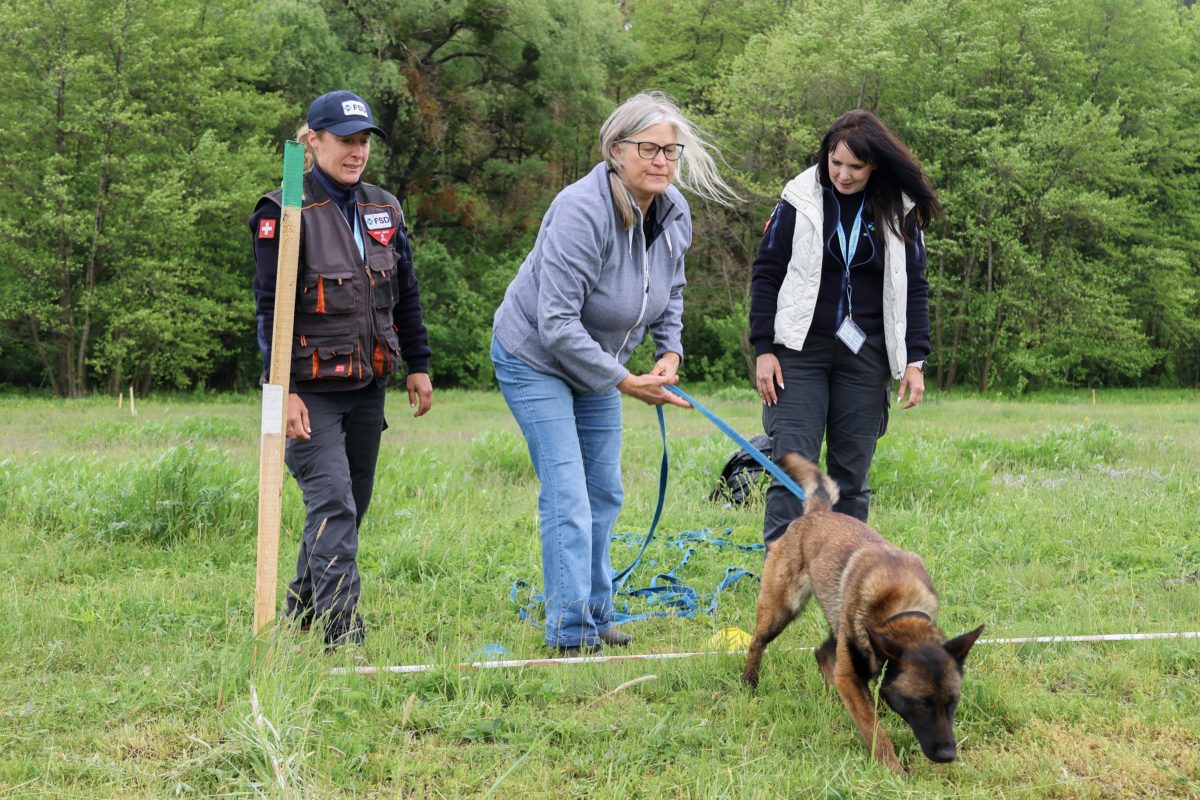Catherine André, FSD Board Member
Report on a visit to Ukraine with FSD (Fondation suisse de déminage)
In May 2025, newly appointed FSD Board Member Catherine André joined Vice-President Thierry Burkart and FSD Director Hansjörg Eberle on a field visit to Ukraine. For Catherine, it was the occasion to gain firsthand insight into FSD’s humanitarian demining operations and the impact of landmines and unexploded ordnance on the daily lives of affected communities.
When you get involved with a humanitarian organisation like FSD, part of the job is to go where help is most urgently needed – even to unsafe areas. Whether as an expert, project manager or member of the board, it is important to listen, support, give thanks – and also, to assure donors that their contributions are going exactly where they are needed.
After careful monitoring of the security conditions up until the last moment, we made the decision to proceed with the trip, despite the tense situation on the ground.
9 May: Arrival in the shadow of war

We travelled from Zurich to Warsaw by plane – and from there on the night train to Kyiv.
The carriages were old, the beds narrow, and the rattling like something from another era.
Fifteen hours of jolting later, the adventure truly began. In between: a cold dinner, fragments of Ukrainian vocabulary, anxieties about the journey, crossing borders – first Poland, then Ukraine.
The conversion of the wheel sets from narrow to broad gauge (a special feature of the post-Soviet railway infrastructure) seems to take forever.
And then comes the customs checks, flashing lights, noises, a racing heart. Sleep is fleeting, but thoughts are not.
10 May – Kyiv: first impressions & first sirens
We arrived in Kyiv early in the morning. My head is buzzing, my body longs for rest — but there is no time for that. A quick check-in at the hotel, a shower – and off we go.
After our first lunch together, we attend a security briefing with the Swiss embassy. The topic of the day: can the planned trip to Kharkiv really go ahead?
Later at the hotel: the first air raid siren. A gentle voice from the warning app urges us to go to the shelter. Memories of my time in Afghanistan come rushing back. I put on the go to the shelter. Memories of my time in Afghanistan come rushing back. I put on the night. No explosions. I remain on the small sofa – ready, but calm.
11 May – Discussions, reality, respect
The next day doesn’t start until 10 a.m. – a welcome breather. Discussions with ministry representatives are on the agenda. The focus is on needs, coordination and the common will to find solutions.
A short city tour reveals a surprisingly calm and tidy Kyiv. Despite three years of war, the population is striving for normality. The noise of drone alarms has long been part of daily life.
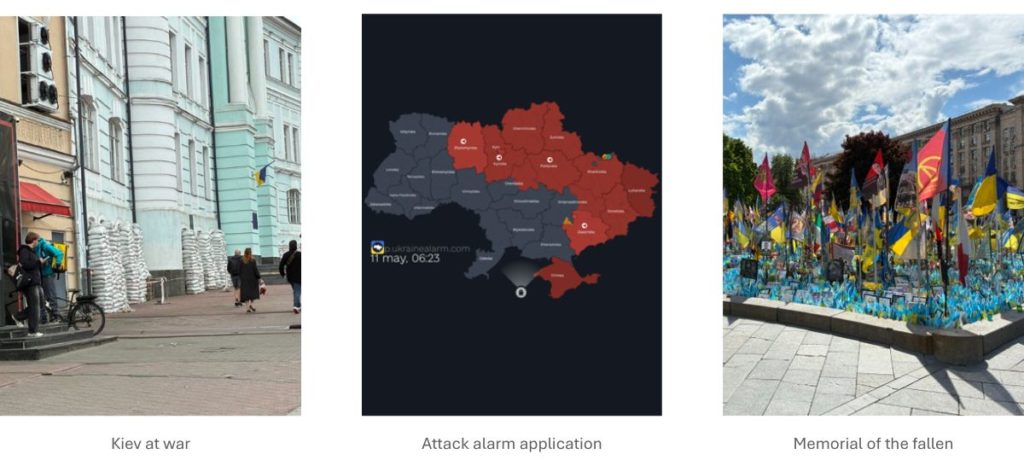
In the afternoon, the decision is made: we will travel to Kharkiv tonight – by night train, a seven-hour journey eastwards, closer to the front line.
12 May – Kharkiv: a city scarred by war.
Once an industrial and educational centre with 1.5 million inhabitants, today it is severely damaged by rocket attacks and constant threats. The city is only about 30 kilometres from the Russian border – and is therefore constantly under fire.
We are taken directly to the field. Rain makes clearing mines too dangerous – the ground is too muddy. We use the time for a safety briefing and intense discussions with the team.
The people who work here are as diverse as they are admirable: a former teacher clears mines so that children can play again. A mechanic who just wants to help.
A marketing specialist who sees his service as a civic duty. Between the lines: anger towards Russia, pain, hope – and a deep desire for peace.
Another highlight: the mine dogs with their handlers, who are being trained at FSD training ground and will hopefully be deployed soon. There are still a few Ukrainian administrative challenges that we were able to address with the ministry the day before.
As night falls, we head back – for safety reasons. Kharkiv is bombed almost daily. On the train, we process what we have seen. And once again, we feel a deep sense of admiration for our team, which is performing at its best under the most difficult conditions.
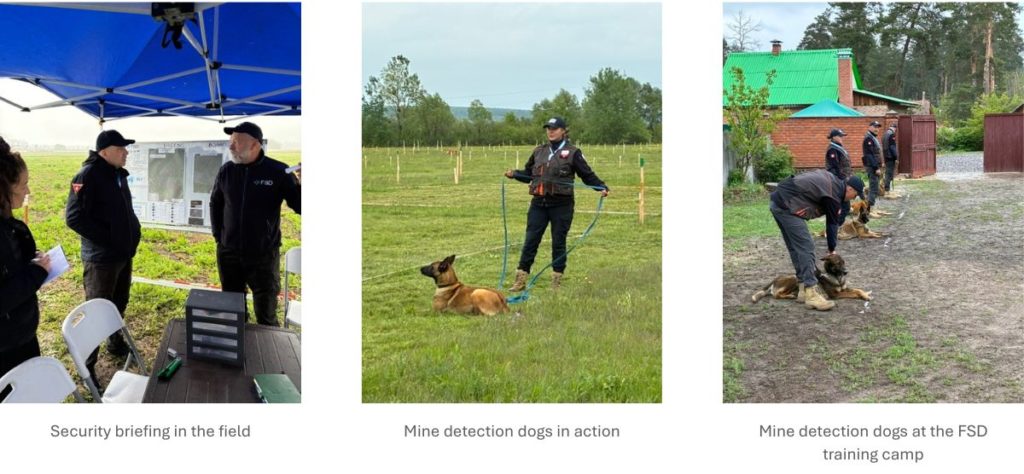
13 May – Return, discussions, prospects
Back in Kyiv — a quick shower, then straight to the Ministry of Economy. The main topic: how can we clear agricultural land faster and safely so that the population can once again provide for itself? The close, trusting relationship between the ministry and FSD is proving invaluable – we speak openly and seek solutions together.
Later, we visit FSD’s headquarters. We exchange with employees, reflect ongoing projects, and plan for the future – even as donations continue to decline.
14 May – Chernihiv: hope amid the rubble
Chernihiv – one of Ukraine’s oldest cities –was heavily hit during the first months of the war. Besieged and encircled by Russian forces for weeks in 2022, it now stands as a symbol of resilience and reconstruction.
The day is packed from start to finish. We begin with a safety briefing, followed by an overview of current projects. Later, we join a training course on how to identify unexploded ordnance — known as the ‘sapper course’. In the afternoon, we attend an explosive ordnance risk education session with a group of primary school children.
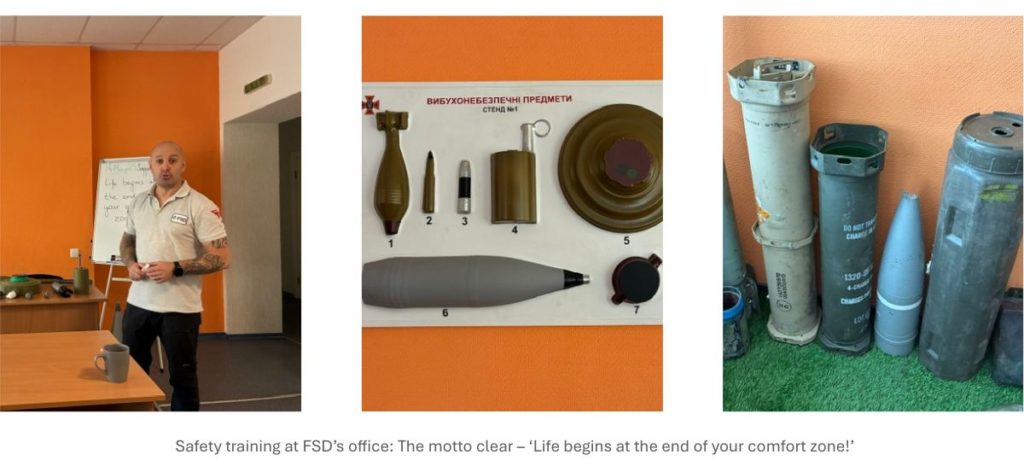
One moment stands more than any other.
We visit a kindergarten – now reopened after FSD teams cleared the grounds of mines. The headmistress, Olena, is nothing short of a heroine. During the attack, she protected children and organised a makeshift classroom underground. Her husband tried to remove glass shards with his bare hands.
Five children did not survive the attack. Their grief is evident in their eyes. We look at each other – words are superfluous.
The risk education training delivered t by three highly motivated FSD staff is impressive –methodically well thought out, child-friendly and delivered with passion. I wish every school in Switzerland could see this. Not to shock, but to awaken.
Children should not have to identify unexploded ordnance.
And yet, here, they must.
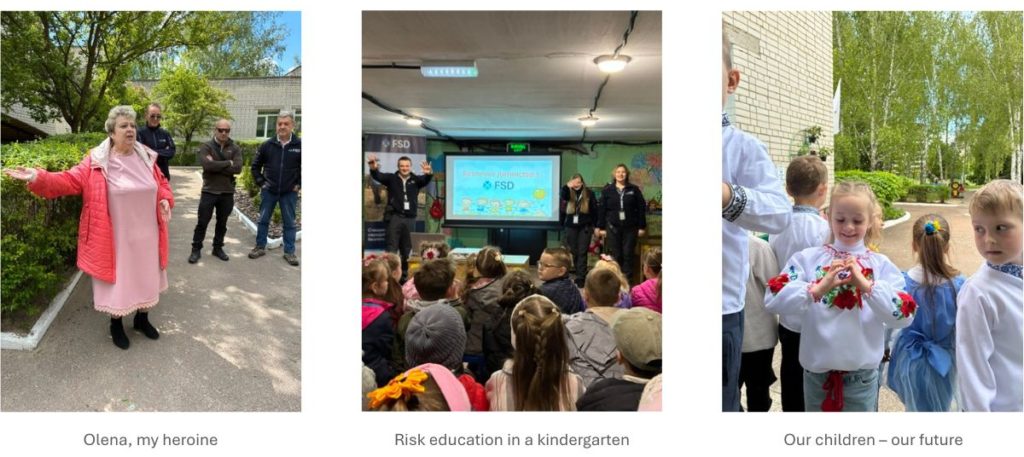
Moving forward through professionalism
We visit other projects:
• A drone demonstration for mine detection.
• A crater analysis exercise: using reconnaissance drones, FSD teams capture detailed imagery of bombed area. I am amazed by the precision. FSD is exploring and applying the latest innovations in humanitarian demining. These visuals help map impact sites, guiding risk survey teams and allowing deminers to plan safer, more targeted clearance operations.
• A visit to the village of Yahidne, occupied by Russian troops in 2022. Over 300 people, including children, were held captive in a cellar for weeks.
Today, FSD teams are working at full capacity here: Rapid BAC (Battle Area Clearance), marking systems, mine detection dogs – every element counts.
15 May – Journey home & heavy thoughts
In the evening, we begin the long return – by train to Warsaw, then on to Switzerland. Time to take a deep breath, reflect and process everything. The body is tired, but the heart is full.
What remains
This trip was no ordinary mission. It was a reminder. A warning. An affirmation.
I am proud to be part of FSD – not only because of our work in Ukraine, but because we are present where help is needed most. Because we listen. Because we act. And because we prove that everyone can contribute:
• Whether through donations, sharing knowledge, or simply through human interaction.
• Peace does not begin at the negotiating table, but in our daily lives.
• We only have one life. And only one Earth.
Let’s strive to be more peaceful, more understanding, and more humble– for our children, and for ourselves.
Catherine André

